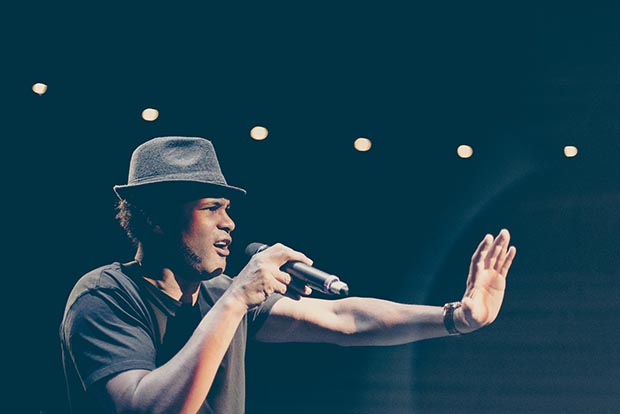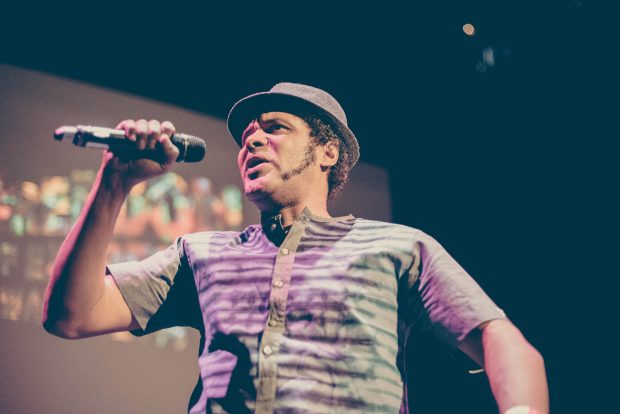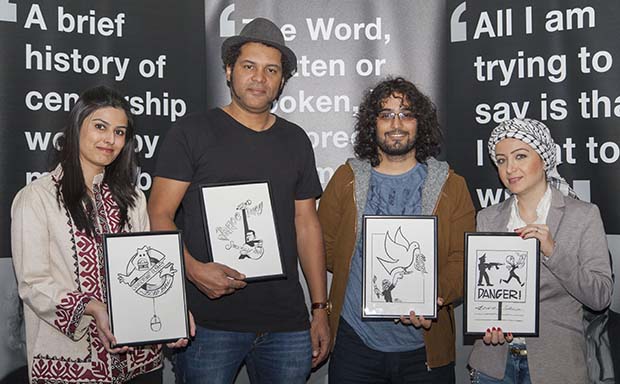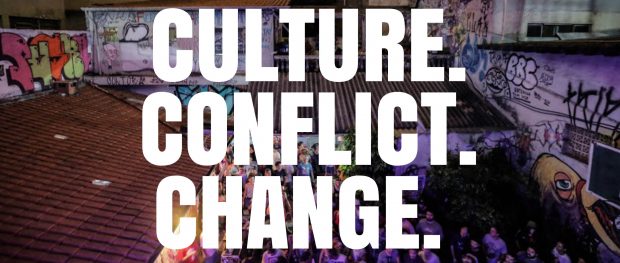Index relies entirely on the support of donors and readers to do its work.
Help us keep amplifying censored voices today.
[vc_row][vc_column][vc_column_text]

Music in Exile Fellowship Winner Serge Bambara, aka Smockey (Photo: Elina Kansikas for Index on Censorship)
On 3 March in Belfort, France, Burkinabe rapper and activist Smockey began a two-month long European tour, despite having his studio destroyed twice in recent years. The rapper, whose given name is Serge Bambara, was the inaugural Index on Censorship Music in Exile Fellow in April of the same year. Just three months after the awards, his recording studio, Studio Abazon, was wrecked in a devastating fire.
“All my music files since 2001, including my master tapes and those of my productions and clients, were lost,” Smockey told Index in September 2016. Two years on, it remains unclear how the fire began.
Smockey’s studio was also bombed in September 2015 by armed forces loyal to Burkina Faso’s former president Blaise Compaoré. This was a vengeful attack for his political activism and music critical of Compaoré’s regime.
Despite these aggressive and censorious acts, Smockey continues to record and perform, combating different forms of injustice with each track. As the founder of the grassroots political movement Le Bilai Citoyen, which helped to oust Compaoré, he often promotes the progressive ideas of Burkina Faso’s former socialist leader Thomas Sankara. The Sankarist ideology involves advocating for women’s rights, fighting corruption and imperialism, and upholding the integrity of Burkinabe people, all of which are reflected in Smockey’s lyrics. La Bilai Citoyen translates as the “the citizen’s broom,” which is “a tribute to Thomas Sankara, who organised weekly street-cleaning sessions,” Smockey told the BBC.
In March 2018 Smockey told news website Africa is a Country that Sankara’s image was that of “simplicity, modesty, and integrity … a model for anyone aspiring to manage public property”. He also noted that Sankara had the “courage and determination to build a Burkina Faso of social justice and inclusive development.”
Although the uprising of 2015 was successful in ridding Burkina Faso of an oppressive twenty-seven-year regime, Smockey is not an enthusiastic supporter of the country’s current government led by the progressive former opposition leader Roch Marc Christian Kaboré. Smockey is still a watchdog for human rights violations within his country. “The ones who were our friends before the revolution can be our enemies today,” he told Quartz Africa in July 2016. “We helped them have this power, but we are not friends because we are still sentinels.” For example, his song Tomber la Lame takes aim at widespread Female Genital Mutilation throughout Africa.
Despite multiple attempts to stop his political and artistic expression, Smockey continues to create and share his music globally. Over six weeks he will perform throughout Europe, finishing his tour in Brussels, Belgium, on 14 April.
[/vc_column_text][/vc_column][/vc_row][vc_row][vc_column][vc_basic_grid post_type=”post” max_items=”4″ element_width=”6″ grid_id=”vc_gid:1522161604778-9ae9ecbc-682f-8″ taxonomies=”8072″][/vc_column][/vc_row]

Burkinabe rapper and activist with Le Balai Citoyen, Smockey, became the inaugural Music in Exile Fellow at the Index on Censorship Freedom of Expression Awards in April 2016. In July his recording studio, the lionised Studio Abazon, was destroyed in a fire.
“All my music files since 2001, including my master tapes and those of my productions and clients, were lost,” Smockey told Index on Censorship. “I was working on the album of a young rapper named Balla, volume three of my compilation called La Part des Ténèbres and original music for a mobile phone service product – all gone.”
Two months on, it still isn’t clear what caused the blaze. “I don’t have any news about ongoing investigations, so all I know is that anyone could have caused it apart from me,” he said.
Studio Abazon was impossible to insure due to a September 2015 firebomb attack by forces loyal to Burkina Faso’s ousted president, which destroyed the studio. Having recently finished rebuilding in the months before the fire, Smockey said he is obliged to do so again. “But this time I will build it underground to make it more secure.”
Some of Smockey’s friends have launched a crowdfunding campaign to raise funds for the studio and the rapper said he would welcome all the help he can get.
When he last spoke with Index, Smockey was writing tracks for his new album. Plans to record have now been put on hold.
Still, the setback hasn’t put the rapper off performing. He recently played to packed gigs in Switzerland, Germany and Belgium, where he took part in the Esperanzah! music festival. In October he will take the stage in his home country at the Waga Hip Hop Festival. In November he will return to Germany — for appearances in Berlin and Munich — and Switzerland. In December, he will perform in Spain.
Le Balai Citoyen, which Smockey co-founded, is a grassroots political movement which helped bring to an end the three-decade rule of former president Blaise Compaoré. It is currently involved in a new project to build a memorial for the late revolutionary Burkinabe leader, and hero of Smockey’s, Thomas Sankara. To raise funds and awareness for the memorial, Smockey will soon perform at Revolution Square, where up to a million people had gathered to demand Compaore’s resignation in 2014.
“We are just nine months past the insurrection, so now is a good time for the memorial,” Smockey told Index. “Seeing it every day in the city would help put pressure on those in power — those who think they can manipulate us but are mistaken — to do their job.”
Rehabilitating the memory of Sankara – who was overthrown and assassinated in a coup d’état led by Compaoré in 1987 – is, therefore, an important part of bringing about of justice for all affected by the crimes of the former regime, Smockey said.
The former prime minister of Burkina Faso, Luc-Adolphe Tiao, who was appointed by Compaoré, was this month charged and jailed for murder. Smockey welcomes this as a step forward for the country.
“We encourage everyone who is implicated in these crimes to stand before justice in this country, at least because we have a certain sense of honour,” he said. “Burkina Faso literally means the land of men with integrity, so we would like to trust the justice of our country.”
Le Balai Citoyen is now working with a coalition of seven other organisations, collectively called Ditanyè, to tackle the challenges facing the country and to preserve “the positive gains from the revolution,” Smockey added.
Looking forward, he understands the country must have priorities and the courage to define them. “After justice, which is necessary for reconciliation, we have to work on the economic recovery and jobs for young people,” he said. “We want to work now.”
Nominations are now open for 2017 Index on Censorship Freedom of Expression Awards. You can make yours here.

Winners of the 2016 Freedom of Expression Awards: from left, Farieha Aziz of Bolo Bhi (campaigning), Serge Bambara — aka “Smockey” (Music in Exile), Murad Subay (arts), Zaina Erhaim (journalism). GreatFire (digital activism), not pictured, is an anonymous collective. Photo: Sean Gallagher for Index on Censorship
Also read:
Zaina Erhaim: Balancing work and family in times of war
Artist Murad Subay worries about the future for Yemen’s children

Winners of the 2016 Freedom of Expression Awards: from left, Farieha Aziz of Bolo Bhi (campaigning), Serge Bambara — aka “Smockey” (Music in Exile), Murad Subay (arts), Zaina Erhaim (journalism). GreatFire (digital activism), not pictured, is an anonymous collective. Photo: Sean Gallagher for Index on Censorship
In the short three months since the Index on Censorship Awards, the 2016 fellows have been busy doing important work in their respective fields to further their cause and for stronger freedom of expression around the world.
GreatFire / Digital activism
GreatFire, the anonymous group of individuals who work towards circumventing China’s Great Firewall, has just launched a groundbreaking new site to test virtual private networks within the country.
“Stable circumvention is a difficult thing to find in China so this new site a way for people to see what’s working and what’s not working,” said co-founder Charlie Smith.
But why are VPNs needed in China in the first place? “The list is very long: the firewall harms innovation while scholars in China have criticised the government for their internet controls, saying it’s harming their scholarly work, which is absolutely true,” said Smith. “Foreign companies are also complaining that internet censorship is hurting their day-to-day business, which means less investment in China, which means less jobs for Chinese people.”
Even recent Chinese history is skewed by the firewall. The anniversary of Tiananmen Square protests of 1989 last month went mostly unnoticed. “There was nothing to be seen about it on the internet in China,” Smith said. “This is a major event in Chinese history that’s basically been erased.”
Going forward, Smith is optimistic for growth within GreatFire, and has hopes the new VPN service will reach 100 million Chinese people. “However, we always feel that foreign businesses and governments could do more,” he said. “We don’t see this as a long game or diplomacy; we want change now and so I feel positive about what we are doing but we have less optimism when it comes to efforts outside of our organisation.”
Winning the Index on Censorship Freedom of Expression Award for Digital Activism has certainly helped morale. “With the way we operate in anonymity, sometimes we feel a little lonely, so it’s nice to know that there are people out there paying attention,” Smith said.
Murad Subay / Arts
During his time in London for the Index awards, Yemeni artist Murad Subay painted a mural in Hoxton, which was the first time he had worked outside of his home country. “It was a great opportunity to tell people what’s going on in Yemen, because the world isn’t paying attention,” he explained to Index.
Since going home, Subay has continued to work with Ruins, his campaign with other artists to paint the walls of Yemen. “We launched in 2011, and have continued to paint ever since.”
The Saw mural, Ruins campaign https://t.co/z7XrE2yTP7 pic.twitter.com/ZMiVjhxZO8
— murad subay (@muradsubay) June 10, 2016
Last month, artists from Ruins, including Subay, painted a number of murals in front of the Central Bank of Yemen to represent the country’s economic collapse.
Thi Yazen Alalawi mural, Ruins campaign https://t.co/c2wkosUIxy pic.twitter.com/UqmuSzczAl
— murad subay (@muradsubay) June 10, 2016
In his acceptance speech at the Index Awards, Subay dedicated his award to the “unknown” people of Yemen, “who struggle to survive”. There has been little change in the situation since in the subsequent months as Yemenis continue to suffer war, oppression, destruction, thirst and — with increasing food prices — hunger.
“The war will continue for a long time and I believe it may even be a decade for the turmoil in Yemen to subside,” Subay says. “Yemen has always been poor, but the situation has gotten significantly worse in the last few years.”
Subay considers himself to be one of the lucky ones as he has access to water and electricity. “But there are many millions of people without these things and they need humanitarian assistance,” he says. “They are sick of what is going on in Yemen, but I do have hope — you have to have hope here.”
The Index award has also helped Subay maintain this hope. As has the inclusion of his work in university courses around the world, from John Hopkins University in Baltimore, USA, and King Juan Carlos University in Madrid, Spain.
Subay’s wife has this month travelled to America to study at Stanford University. He hopes to join her and study fine art. “Since 2001 I have not had any education, and this is not enough,” he explains. “I have ideas in my head that I can’t put into practice because i don’t have the knowledge but a course would help with this.”
Zaina Erhaim / Journalism
Syrian journalist and documentary filmmaker Zaina Erhaim has been based in Turkey since leaving London after the Index Awards in April as travelling back to Syria isn’t currently possible. “We don’t have permission to cross back and forth from the Turkish authorities,” she told Index. “The border is completely closed.”
Erhaim is with her daughter in Turkey, while her husband Mahmoud remains in Aleppo.
“The situation in Aleppo is very bad,” she said. “A recent Channel 4 report by a friend of mine shows that the bombing has intensified, and the number of killings is in the tens per day, which hasn’t been the case for some weeks; it’s terrible.”
The main hospital in Aleppo was bombed twice in June. “Sadly this is becoming such a common thing that we don’t talk about it anymore,” Erhaim added.
She has largely given up on following coverage of the war in Syria through US or UK-based media outlets. “It is such a wasted effort and it’s so disappointing,” she explained. “I follow a couple of journalists based in the region who are actually trying to report human-side stories, but since I was in London for the awards, I haven’t followed the mainstream western media.”
Erhaim has put her own documentary making on hold for now while she launches a new project with the Institute for War and Peace Reporting this month to teach activists filmmaking skills. “We are going to be helping five citizen journalists to do their own short films, which we will then help them publicise,” she said.
Documentary filmmaking is something she would like to return to in future, “but at the moment it is not feasible with the situation in Syria and the projects we are now working on”.
Bolo Bhi / Campaigning
The last time Index spoke to Farieha Aziz, director of Bolo Bhi, the Pakistani non-profit, all-female NGO fighting for internet access, digital security and privacy, the country’s lower legislative chamber had just passed the cyber crimes bill.
The danger of the bill is that it would permit the Pakistan Telecommunication Authority to manage, remove or block content on the internet. “It’s part of a regressive trend we are seeing the world over: there is shrinking space for openness, a lot of privacy intrusion and limits to free speech,” Aziz told Index.
Thankfully, when the bill went to the Pakistani senate — which is the upper house — it was rejected as it stood. “Before this, we had approached senators to again get an affirmation as they’d given earlier saying that they were not going to pass it in its current form,” Aziz added.
Bolo Bhi’s advice to Pakistani politicians largely pointed back to analysis the group had published online, which went through various sections of the bill and highlighting what was problematic and what needed to be done.
This further encouraged those senators who were against the bill to get the word out to their parties to attend the session to ensure it didn’t pass. “It’s a good thing to see they’ve felt a sense of urgency, which we’ve desperately needed,” Aziz said.
“The strength of the campaign throughout has actually been that we’ve been able to band together, whether as civil society organisations, human rights organisations, industry organisations, but also those in the legislature,” Aziz added. “We’ve been together at different forums, we’ve been constantly engaging, sharing ideas and essentially that’s how we want policy making in general, not just on one bill, to take place.”
The campaign to defeat the bill goes on. A recent public petition (18 July) set up by Bolo Bhi to the senate’s Standing Committee on IT and Telecom requested the body to “hold more consultations until all sections of the bill have been thoroughly discussed and reviewed, and also hold a public hearing where technical and legal experts, as well as other concerned citizens, can present their point of view, so that the final version of the bill is one that is effective in curbing crime and also protects existing rights as guaranteed under the Constitution of Pakistan”.
A vote on an amended version of the bill is due to take place this week in the senate.
Smockey / Music in Exile Fellow
Burkinabe rapper and activist Smockey became the inaugural Music in Exile Fellow at the Index on Censorship Freedom of Expression Awards, and last month his campaigning group Le Balai Citoyen (The Citizen’s Broom) won an Amnesty International Ambassador of Conscience Award.
“This was was given to us for our efforts in the promotion of human rights and democracy in our country,” said Smockey. The award was also given to Y en a marre (Senegal) and Et Lucha (Democratic Republic of the Congo).
“We are trying to create a kind of synergy between all social-movements in Africa because we are living in the same continent and so anything that affects the others will affect us also,” Smockey added.
Le Balai Citoyen has recently been working on programmes for young people and women. “We will also meet the new mayor of the capital to understand all the problems of urbanism,” Smockey added.
While his activism has been getting international recognition, he remains focused on making music with upcoming concerts in Belgium, Switzerland and Germany, and he is currently writing the music for an upcoming album. A major setback has seen Smockey’s acclaimed Studio Abazon destroyed by a fire early in the morning of 19 July. According to press reports the studio is a complete loss. The cause is under investigation.
Despite this, Smockey is still planning to organise a new music festival in Burkina Faso. “We want to create a festival of free expression in arts,” Smockey said. “And we are confident that it will change a lot of things here.”
He is thankful for the exposure the Index Awards have given him over the last number of months. “It was a great honour to receive this award, especially because it came from an English country,” he said. “My people are proud of this award.”

Since its birth in the Bronx in the 1970s, hip hop has made its mark. Today, graffiti artists, MCs, breakdancers and DJs across the world are still using the medium to empower themselves, from women in Columbia and political movements in Burkina Faso, to aiding the fight for free speech in Zimbabwe and challenging religious stereotypes in the UK.
Index on Censorship has teamed up with In Place of War to create two unique full-day events that provide an opportunity to listen to, learn from and collaborate with 14 world-changing hip hop artists from eight different countries.

A multi-disciplinary full-day academic conference that considers hip-hop’s role in revolutionary social, political and economic movements across the world.
The Power of Hip Hop: Exchange will explore the role, challenges and potential of hip-hop culture in facilitating positive social change in global contexts, and its role as a site of resistance and identity.
The day features academic panels, keynote papers, artist performances and practitioner presentations. This event harnesses In Place of War’s vast international network of grassroots artists and University of Manchester origins, to explore issues including hip hop and gender, race, religion, commerce, and conflict.
When: 8 July 2016, 10.00 – 18.30 (registration 9.30)
Where: Richmix, London (map)
Tickets: £45/£36 concessions – lunch, refreshments and delegate packs included (buy online)
Promo Code: “hiphop15” (£15 ticket). Can be redeemed online at checkout, over the phone or at the box office.

A day of TED-style talks and live performance. Join 14 of hip hop’s most revolutionary artists from across the world for a mix of music, dance, rap, DJing, VJing, exhibitions and satire.
From local grassroots initiatives to multi-national citizen movements, you’ll hear stories of how hip hop is changing the world first-hand. You’ll encounter the artists performing live. And you’ll have chances to meet the speakers throughout the day, before a DJ set and drinks to end it.
Featuring Index on Censorship’s inaugural Music in Exile fellow Smockey (Burkina Faso), Rodney P (UK), Zambezi News (Zimbabwe), Wade Waters (USA), Poetic Pilgrimage (UK), SYMBIZ (Germany), Shhorai (Colombia), Afrikan Boy (UK/Nigeria) and more.
When: 9 July 2016, 12.00 – 19.30 (doors 11.30)
Where: Richmix, London (map)
Tickets: £20/£15 concessions (buy online)
Promo Code: “hiphop10” (£10 ticket). Can be redeemed online at checkout, over the phone or at the box office.